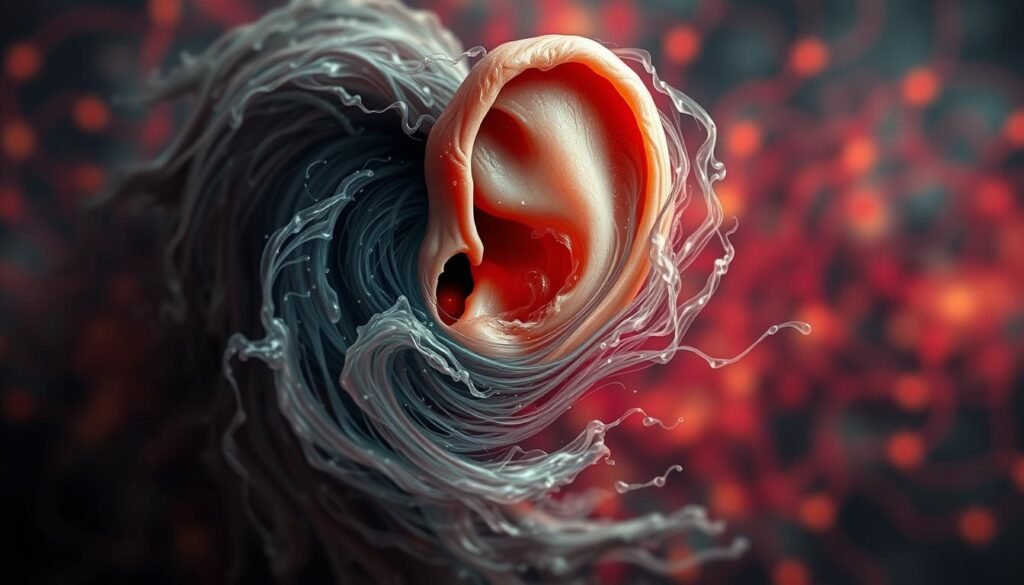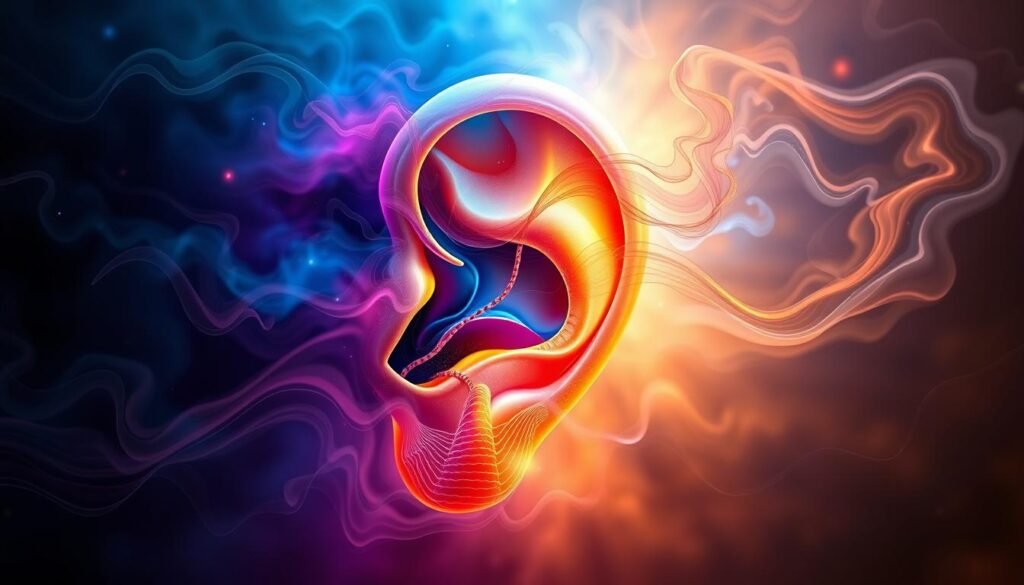Did you know more than one-third of people report vestibular symptoms at some point? This fact shows how common inner ear issues are. They lead to dizziness and balance problems. The inner ear helps with balance and hearing. So, problems here can make daily life hard. These issues can cause symptoms like vertigo and dizziness. They may also make you feel anxious. Plus, circulatory problems can make these issues worse, affecting your well-being.
It’s important to understand how inner ear issues, anxiety, and circulatory problems are linked. Knowing this helps in finding the right treatment. By understanding these connections, you can deal better with symptoms and find proper help.
Key Takeaways
- Vestibular symptoms affect over one-third of people, indicating widespread inner ear issues.
- Inner ear problems are a common cause of dizziness and balance disorders, especially in older adults.
- Anxiety often arises as a response to the symptoms of inner ear issues.
- Poor circulation can adversely affect inner ear function.
- Understanding the link between these conditions is key to effective management.
Understanding Inner Ear Issues
Inner ear problems impact balance and hearing. These issues often link to vestibular problems, which hurt daily life. Spotting the symptoms of inner ear issues is key to getting the right help.
What Are Inner Ear Issues?
Many conditions disrupt the inner ear’s work. Benign paroxysmal positional vertigo (BPPV) is a common cause of vertigo in adults. Vestibular neuritis and Meniere’s disease are also major concerns. Knowing about these conditions helps people understand what they’re up against.
Common Symptoms of Inner Ear Problems
People with inner ear issues often feel:
- Dizzy or light-headed
- A sense of spinning (vertigo)
- Unsteady or losing balance
- Vision blurs
- Nausea
These symptoms of inner ear issues can mess with daily life. Meniere’s disease, for example, can cause long, harsh vertigo. This can make people anxious and afraid it will happen again.
Causes of Inner Ear Disorders
Inner ear disorders come from various sources:
| Cause | Description |
|---|---|
| Infections | Viral or bacterial infections affect balance. |
| Medications | Some drugs can cause dizziness or balance problems. |
| Structural Problems | Tumors or other changes can hurt the inner ear. |
| Trauma | Head injuries can damage inner ear balance. |
Also, Meniere’s disease and acoustic neuroma add to the complexity of vestibular disorders. Spotting these causes is critical for the right treatment.
The Link Between Inner Ear Issues and Anxiety
Many people get anxious because of inner ear problems. Conditions like vertigo make daily life scary. This is because people fear dizziness and the anxiety that comes with it.
The fear of vertigo episodes makes their anxiety worse. This has a big effect on their mental health.
How Inner Ear Problems Can Trigger Anxiety
Dizziness is common with inner ear issues, like BPPV or Meniere’s disease. It makes keeping balance hard. Worrying about another dizziness episode can cause a lot of anxiety.
Research shows about 90% of people with balance problems also have anxiety. This shows how important it is to treat both the mind and body.
The Psychological Impact of Dizziness and Vertigo
Dizziness and vertigo seriously affect people’s mental state. During an episode, many feel panic. This leads to more distress.
Even without clear inner ear problems, complaints of dizziness can cause anxiety. Studies have found a link between anxiety and migraines too. About 80% of people with migraines also feel anxious.
It’s vital to understand these links to manage anxiety and dizziness well. To learn more about how anxiety relates to inner ear issues, read this detailed analysis.

Anxiety and Its Physiological Effects
Anxiety greatly affects our health. It impacts many body systems. The physical effects of anxiety can worsen conditions like dizziness and vertigo. This issue is tough because anxiety and ear problems are common in older people. They share a complex link that needs careful handling.
How Anxiety Influences Physical Health
Anxiety can trigger the body’s fight-or-flight response. This releases stress hormones like adrenaline and cortisol. These hormones increase the heart rate, speed up breathing, and tighten muscles.
Such effects can make dizziness and vertigo worse. This leads to issues in daily life. Anxiety disorders are also widespread, affecting many people of all ages.
Common Symptoms of Anxiety
It’s key to recognize common symptoms of anxiety. Often, symptoms show up in physical ways. Noticing them is a crucial step.
- Excessive worry
- Restlessness
- Fatigue
- Increased heart rate
- Sweating and trembling
- Dizziness and lightheadedness
These symptoms often overlap with other conditions like anxiety and vertigo. This makes treatment more complex.
How Anxiety Can Worsen Vertigo
Anxiety causes physical reactions that worsen dizziness. People with inner ear issues say anxiety makes their vertigo worse. Treating anxiety can reduce dizziness and help with daily activities.
Handling both anxiety and its effects is crucial. Techniques like cognitive-behavioral therapy, mindfulness, or vestibular rehab can help tackle these linked issues.

| Common Anxiety Symptoms | Related Physical Effects |
|---|---|
| Increased Heart Rate | Dizziness |
| Rapid Breathing | Feeling Lightheaded |
| Sweating | Dry Mouth |
| Trembling | Nausea |
| Fatigue | Reduced Social Interaction |
Circulatory Problems and Their Impact on Inner Ear Function
Knowing how blood flow issues affect the inner ear is key to staying healthy. The inner ear needs good blood flow to work right. Issues like hypertension or diabetes can drop blood flow there. This may cause several problems.
Understanding Circulatory Issues
Many conditions impact the heart and blood vessels. Heart disease, arrhythmia, and high blood pressure play big roles. They can limit blood flow, making circulation poor. This is especially bad for the inner ear. It needs a constant flow of oxygen-rich blood to keep working well.
How Poor Circulation Affects the Inner Ear
Not enough blood in the inner ear can spell trouble. The ear’s delicate hair cells need strong circulation to live. If blood flow drops, these cells could get damaged or die. This may cause hearing loss. Also, you might feel dizzy or hear ringing. Stress can make these issues worse, hurting your circulation and ear health more.
It’s crucial to tackle blood flow issues early. Regular check-ups and stress control through exercise, laughter, and meditation can help. Keeping your heart healthy might boost your ear’s health and your overall quality of life.
| Circulatory Issue | Impact on Inner Ear | Poor Circulation Symptoms |
|---|---|---|
| Hypertension | Reduced blood flow leading to potential hearing loss | Dizziness, pulsatile tinnitus |
| Diabetes | Damage to blood vessels affecting inner ear health | Weakness, fatigue, hearing difficulties |
| Heart Disease | Inadequate oxygen supply to inner ear structures | Lightheadedness, buzzing sounds in ears |
Inner Ear Issues, Anxiety, and Circulatory Problems
The link between inner ear issues, anxiety, and circulatory problems is complex. These health issues can make each other worse. For example, bad circulation can cause dizziness. This dizziness then leads to anxiety. Breaking this cycle can be hard.
The Interrelationship of These Conditions
Grasping how these conditions connect is key. Circulatory problems can lead to feeling dizzy. Conditions like Meniere’s disease or benign positional vertigo make this worse. Then, anxiety steps in, adding more stress. Finding ways to intersect these issues is essential for better health.
Preventative Measures and Management
Putting in place management strategies and preventative measures is crucial. Seeing doctors regularly helps keep track of symptoms. It also manages issues like high blood pressure or diabetes. Drinking plenty of water and reducing stress through meditation or yoga helps too.
Table 1 below shows important management strategies:
| Management Strategy | Description |
|---|---|
| Regular Check-Ups | Monitoring symptoms and underlying conditions through regular medical visits. |
| Hydration | Maintaining fluid intake to support overall circulation and health. |
| Stress Management | Employing relaxation techniques such as meditation and yoga to reduce anxiety. |
| Dietary Adjustments | Focusing on whole foods to improve overall health and manage symptoms. |
| Therapeutic Exercises | Engaging in balance training and vestibular rehabilitation exercises. |
You can discover more about natural approaches here. These tips help lessen the effects of inner ear issues, anxiety, and circulatory problems. Following them can lead to a healthier life.

The Role of Hearing Loss in This Triangle of Conditions
Hearing loss is often linked with inner ear disorders. It leads to fewer sounds being heard, making talking and socializing hard. This issue affects more than just hearing. It also hits emotional and mental health.
How Hearing Loss Relates to Inner Ear Issues
Many studies show a link between hearing loss and inner ear problems. Meniere’s disease, for example, includes hearing loss, vertigo, and ringing in the ears. The inner ear is crucial for hearing and balance. If it’s damaged, it can make hearing loss worse. This often creates a cycle of worsening conditions. Anxiety and depression are more common in people with tinnitus. This shows how hearing problems and emotional stress are related.
The Emotional Toll of Hearing Loss
People with hearing loss often feel alone and upset. This can lead to serious mental health issues. For instance, people with tinnitus are likelier to be depressed than those without it. Hearing loss can drive people away from friends, making them feel more isolated.
This table shows how hearing loss links to inner ear issues and their emotional effects:
| Condition | Prevalence of Depression | Prevalence of Anxiety | Prevalence of Somatic Symptoms |
|---|---|---|---|
| Tinnitus | 7.9% | 5.4% | 40.4% |
| No Tinnitus | 4.6% | 3.3% | 26.9% |
It’s critical to understand the emotional effects of hearing loss. Treating the hearing issues and emotional distress together is key. This holistic approach can improve life for those with hearing loss and inner ear problems.
Diagnosis of These Disorders
To diagnose inner ear issues and related anxiety, we need a team approach. This way, we can find the root causes. It’s critical to do tests on the inner ear. These tests show if there’s a balance disorder impacting health.
Tests for Inner Ear Problems
We use several tests to spot vestibular disorders. Here are the main ones:
- Hearing tests: Essential for confirming hearing loss, particularly in conditions like Meniere’s disease.
- Balance assessments: These evaluate the inner ear’s contribution to balance.
- Electronystagmography (ENG): Measures involuntary eye movements to assess vestibular function.
- Rotary chair testing: Assesses a person’s balance response to moving environments.
- Imaging scans: Such as CT or MRI, to rule out other potential causes of symptoms.
| Test | Purpose | Frequency of Use |
|---|---|---|
| Hearing Tests | Identify hearing loss | Common in Meniere’s diagnosis |
| Balance Assessments | Evaluate balance issues | Routine for vestibular disorders |
| ENG | Measurements of eye movements | Often used in specialized clinics |
| Rotary Chair Testing | Assess balance response | Less commonly performed |
| Imaging Scans | Rule out other issues | When other tests indicate abnormalities |
Evaluating Anxiety and Its Causes
To check for anxiety, doctors use interviews and questionnaires. This helps them see how inner ear problems affect mood. Understanding someone’s anxiety is key. It means treatments can then support both mind and body.
Looking into anxiety is vital, especially with vestibular disorder symptoms. The check-up can involve:
- Clinical interviews for subjective assessment.
- Questionnaires that provide insights into anxiety levels.
- Behavioral assessments to understand coping mechanisms and triggers.
Treatment Options for Inner Ear Issues and Anxiety
It’s key to find good treatments for inner ear problems and related anxiety. These issues often mix, needing a full plan for health care and therapy. We’ll look at treatments and therapies that help with these issues.
Medical Treatments for Inner Ear Issues
How we treat inner ear issues depends on the cause and the patient’s specific problems. Treatments can include:
- Medicines for infections or swelling, which help with symptoms.
- Exercises that help with balance and deal with inner ear troubles.
- Surgery for tough cases, like Meniere’s disease or ongoing vestibular issues.
The Epley move is a known technique for Benign Paroxysmal Positional Vertigo (BPPV). It often works well in fixing balance. You can find more about treatment methods and how good they are in this study.
Managing Anxiety: Therapy and Medication
Handling anxiety requires several approaches. Therapy, especially cognitive behavioral therapy, is critical. Medications like selective serotonin reuptake inhibitors also help with symptoms from anxiety. It’s vital to treat anxiety in a whole way, making changes to lifestyle and reducing stress too.
With the right medical care for inner ear problems and therapy for anxiety, patients can feel more balanced. This helps them physically and mentally.
Conclusion
The link between inner ear issues, anxiety, and blood circulation is complex. It deeply affects people’s everyday lives. Studies show that about 70.57% of patients feel anxious. And 49.37% have stress symptoms. It’s key to see how connected these issues are. Especially how ear problems and hearing loss can make mental health worse.
To tackle these issues well, we need a complete approach. This method helps with ear symptoms and looks after mental health, like anxiety and depression. Working with different doctors, both for physical and mental health, makes treatment personal.
Acting early can really improve life for those suffering. Mixing medical treatments with therapy for anxiety makes getting better more likely. Knowing how inner ear issues and anxiety are linked helps doctors care better. For more on how to deal with these problems, check out this resource.